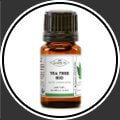Psoriasis is a non-contagious inflammation of the skin whose symptoms can vary widely. This chronic disease is known for several symptoms such as plaques, scales, drop-shaped lesions, redness, dry areas, or even pustules. Symptoms usually appear on the scalp, back, knees and ankles. Environmental and hereditary factors as well as stress or liver dysfunction can trigger psoriasis. Until the cause is identified, there will be no permanent treatment. Psoriasis is difficult to treat. Treatment may involve different approaches. Aromatherapy, psychological monitoring, nutrition and allergy advice, good stress management, as well as a liver detoxification program can be very effective in treating the symptoms of psoriasis. Find all our advice for treating psoriasis naturally using vegetable oils and essential oils.


Borage OIL and essential oils to SOOTH and treat THE SKIN IN CASE OF PSORIASIS
Prepare a soothing lotion by mixing:
- 10 ml d'avocado oil
- 20 ml d'Borage oil
- 20 ml d'wheat germ oil or of rosehip
- 10 drops oftea tree essential oil
- 10 drops ofrosemary verbenone essential oil (one of the best against psoriasis)
- 5 drops ofmyrtle oil
How to use it ?
Make your mixture in a roll-on type bottle for ease of use then apply locally at least twice a day to the affected areas.NOTE: Read carefully the precautions for using rosemary verbenone: prohibited for pregnant or breastfeeding women and children. Contraindicated for epileptics. No prolonged use without medical advice.

Evening primrose oil and wheat germ oil AGAINST PSORIASIS (relieves and reduces symptoms)
Mix the following ingredients in a 125 ml bottle:
- 50 ml d'wheat germ vegetable oil
- 50 ml d'evening primrose vegetable oil
- 25 ml d'rosehip vegetable oil
- 15 drops offine lavender essential oil
- 10 drops ofItalian helichrysum essential oil
- 10 drops ofbourbon geranium essential oil
Pour all the ingredients in order and shake vigorously to mix well.
How to use it ?
You can use this oil as a massage twice a day all over the body after a shower when the skin is still damp, massaging gently or only on the areas to be treated several times a day. You can also soak 250ml of finely ground oats in a small amount of this oil mixture for 30 minutes. Then gently massage the areas affected by psoriasis with this mixture.
Natural remedy with essential oils against itchy scalp in cases of psoriasis
Mix:
- 25 ml of cider vinegar
- 75 ml d'lavender hydrosol
- 10 drops oflavender essential oil
- 10 drops ofItalian helichrysum essential oil
- 10 drops oftea tree essential oil
How to use it ?
Mix all the ingredients in a bottle fitted with a spray. Shake vigorously and spray onto the scalp several times a week (spray 2 to 3 cm from the scalp). Be careful not to spray into your eyes!
Psoriasis: reduce inflammation with essential oils
Mix:
- a large handful of Dead Sea salt
- 5 drops ofItalian helichrysum essential oil
- 5 drops oflavender essential oil
- 5 drops ofbourbon geranium essential oil
- 1 tablespoon of St. John's wort macerate
How to use it ?
To reduce inflammation and relieve itchy skin, mix these ingredients in a small bowl then add directly to your bath once or twice a week.Contraindications:
These synergies should not be used in pregnant women (during the entire pregnancy), breastfeeding women and children under 10 years old.
These properties and methods of use do not constitute medical advice. For therapeutic use consult a doctor.

What is psoriasis?
Psoriasis is a chronic autoimmune disease that causes a buildup of epidermal cells on the surface of the skin, which can cause scarring, painful inflammation, swelling, heating and redness.
The cause of the appearance of psoriasis is often linked to the immune system and particularly to a cell called a “T cell”, which protects the body from infections and diseases. If you have psoriasis, these cells will cause a dysfunction of the immune system which can cause inflammation of the skin and (too) rapid renewal of epidermis cells. Psoriasis develops because cells regenerate too quickly but slowly rise to the surface of the skin. For a healthy organism, this regeneration process requires between 21 and 28 days. For people with psoriasis this regeneration occurs in just 2-6 days. The cells grow faster and therefore accumulate on the surface of the skin.
Although adults aged 15 and over are more likely to be affected by psoriasis, it is also possible for children under 2 years of age to present these symptoms.
There are also certain predisposing factors for psoriasis, regardless of age:
- Hereditary nature (in 1 in 3 cases)
- Viral or bacterial infection
- Obesity
- Smoking
- Excessive consumption of alcohol
- Stress/emotional shock
Certain medications, such as those used to treat bipolar disorder and blood pressure, may also have an impact.

SYMPTOMS OF PSORIASIS
There are several different types of psoriasis - all have different symptoms and effects, but all are irritating. Although the symptoms of psoriasis can vary from person to person, here is a list of the most common ones to be wary of:
- Scales: often in the form of red spots covered by silvery scales
- Small dry areas that may peel (usually seen on children)
- Dry, cracked skin that may bleed
- Itching, burning or pain
- Thick, ridged or pockmarked nails
- Swollen and stiff joints
Essential oils to treat psoriasis
Essential oils with anti-inflammatory and calming properties are ideal: tea tree, Italian helichrysum, lavender, Virginia cedar, verbenone rosemary, bergamot, bourbon geranium and chamomile can prevent the appearance of infections, pain and psoriasis-related rashes.

Italian helichrysum essential oil:
Its anti-allergenic and anti-inflammatory properties make it an excellent remedy for acne, hives, dermatitis or eczema. Antiseptic, it is also very effective on wounds, psoriasis and skin inflammations. A natural antidepressant, it has psychoaffective properties which facilitate “letting go” (very effective in cases of emotional shock, which is a source of the development of psoriasis). It is also an immune system stimulant (a possible cause of psoriasis).

Rosemary verbenone essential oil:
Toning and purifying, rosemary verbenone essential oil stimulates your immune system and helps your body fight infections. It is a purifying essential oil for the liver, circulatory and anti-stress, it is therefore ideal to help you rebalance what may have caused psoriasis.
NOTE: Read carefully the precautions for using rosemary verbenone: prohibited for pregnant or breastfeeding women and children. Contraindicated for epileptics. No prolonged use without medical advice.

Tea tree essential oil:
Stimulates the immune system. It is an anti-fungal which attacks the fungi responsible for mycoses. It is also a powerful antiseptic, which cleanses and tones both the scalp and the skin. It will also serve as a natural preservative for your cosmetic preparations thanks to its bactericidal properties.

Fine lavender essential oil:
The benefits of lavender essential oil for the skin can in some cases be attributed to its antiseptic and antifungal properties. It is used in many skin care products to treat acne, psoriasis, as well as certain inflammations. It is also known for its healing benefits, and is particularly useful on cuts, burns and sunburns as it helps regenerate scar tissue. Mixed with chamomile essential oil, it is very effective against certain types of eczema.

Geranium bourbon essential oil:
Balancing and harmonizing for all skin types; effective on acne, wounds and burns, eczema, psoriasis, rosacea, prevention of stretch marks. It is one of the most effective essential oils for skin beauty.

Bergamot essential oil:
It is excellent for treating skin problems like acne, eczema or psoriasis. Antifungal and healing, it is recommended in the presence of infected wounds. Skin regenerator and purifier, it treats skin irritations and softens dry or cracked skin.

Roman Chamomile essential oil:
Its regulatory properties of the nervous system make it one of the most effective essential oils for calming stress, anxiety, depression, nervous shocks, insomnia and agitation. It is also an excellent treatment for the skin in cases of itching, allergies (also suitable for allergies of respiratory origin), shingles, eczema, psoriasis or acne. Roman Chamomile essential oil is particularly suitable for taking care of your skin on a daily basis.
Vegetable oils to treat psoriasis
Vegetable oils, such as sweet almond, broccoli, evening primrose, jojoba, calophyll, rosehip and wheat germ, are rich in fatty acids, and have nourishing or anti-inflammatory effects. Using these oils may benefit your skin conditions and will help reduce symptoms and prevent dehydration of the skin, which causes itching and irritation.
Soothing body butters are another remedy for dry skin. Shea butter is highly concentrated in unsaponifiable fatty acids. These fatty acids help heal damaged skin and soften it. It is recommended to use it accompanied by beeswax, coconut oil or jojoba.
Medical studies have shown that 60% of people with psoriasis were treated with evening primrose oil treatments, at a rate of 500 mg 6 times a day.

Calophyll oil:
This dark brown-green oil is an excellent anti-inflammatory used in cases of eczema, psoriasis, scars or acne. It is also known to relieve pain. Healing, it accelerates the regeneration of epidermis cells and strengthens the suppleness and elasticity of the skin.

Sweet almond oil:
It is an oil with multiple properties, very rich in minerals (potassium, phosphorus, calcium, magnesium, iron, zinc and copper). For internal use, it is a mild laxative which fights against constipation, particularly well suited to children and the elderly. Very gentle, it is best known for the care of infants. Used in massage, it calms itching, skin irritations (eczema & psoriasis), and fills cracks. Rich in linoleic acid and vitamin A and E, it improves skin elasticity and accelerates cellular repair. It nourishes it, softens it and gives it a very soft touch. Rich in Omega 6 and Omega 9, it hydrates the skin and fights against chapped lips and dry skin.

Wheat germ oil:
Is a very popular oil both as a cosmetic ingredient and as a dietary supplement. Naturally rich in vitamin A, D, B1, B2, B3, B6, E and F, it is also a very valuable source for the skin and the body of essential fatty acids, proteins and minerals. Its high antioxidant content (vitamin E) and its regenerating properties make it a high-end ingredient for all beauty treatments, particularly for anti-aging and anti-wrinkle treatments. Used regularly, this oil promotes good blood circulation in the epidermis, keeping your skin luminous, supple and healthy. Wheat germ oil is also known to help treat eczema and psoriasis. Very nourishing, it hydrates, softens and softens all skin types (ideal for dry and very dehydrated skin).

Huile the jojoba:
Jojoba oil is known for its calming and healing action. It protects against dehydration and slows down water loss from skin cells. Nourishing, it penetrates deep into the skin without leaving a greasy film on the surface.

Evening primrose oil:
It is very rich in Omega 3. Externally, it softens and regenerates the skin, protecting it from external aggressions. Internally, it is known to reduce the inflammatory effects of psoriasis.
Attention !!! This oil is not recommended for pregnant or breastfeeding women and children under 7 years old.

Rosehip oil (muscat rose):
Highly concentrated in essential fatty acids, Rosehip oil or Rosehip oil is one of the beauty oils par excellence. Its richness in retinols (vitamin A) makes it an incredible regenerating and repairing oil. It stimulates the synthesis of collagen. It quickly penetrates the epidermis and acts deeply, without leaving a greasy feeling.
It is one of the most recognized oils in the treatment of damaged skin and psoriasis.

Differences between PSORIASIS and ECZEMA?
At first glance, it would seem that psoriasis and eczema are two identical things. Although they are both chronic and affect the skin, psoriasis and eczema have very different characteristics.
Eczema, also known as dermatitis, is the term used for various skin problems. In most cases eczema leads to dry skin, itching and rashes on the face, hands, feet, in the bends of the elbows and knees. If you scratch these parts of the skin, then they turn red, causing even more itching and swelling.
Psoriasis causes cells to build up on the skin quickly (usually within days instead of weeks). Because of this buildup, dry, red, painful patches and scales form.
The reason people often confuse eczema and psoriasis is because some of the symptoms are similar. However, other symptoms will help you determine whether you have eczema or psoriasis. Aside from the symptoms common to eczema and psoriasis, namely dry skin, red patches, itching, etc., eczema often causes the following symptoms: brown spots, swelling of the skin, crusts or oozing.

HOW TO RECOGNIZE PSORIASIS?
The main sign of psoriasis is the appearance of thick red patches that cause itching and pain, covered by silvery “scales” (scales). These plaques can appear on all parts of the body, but their favorite areas are:
- Legs
- Scalp, neck
- Lower back
- Face
- Palms of the hands
- Soles
- Fingernails and toenails
- The mucous membranes (genitals, mouth, etc.) can also be affected by psoriasis, so these parts of the body must be checked regularly.
CAUTION: Rapid detection and appropriate treatment are very important because psoriasis can lead to other serious complications.

DAILY TIPS TO REDUCE PSORIASIS SYMPTOMS:
- Check your food for allergens
- Vitamin D is known to be beneficial for psoriasis
- Sun exposure and sea water usually provide temporary relief
- We strongly advise against smoking, consuming alcohol and any food that may contain pesticides, in order to prevent liver poisoning which gets rid of toxins via our skin.
- Strengthen your immune system
- Avoid any stressful situation
- Avoid skin injuries and infections
NATURAL REMEDIES TO TREAT PSORIASIS
The goal of psoriasis treatments is to limit symptoms and prevent infection. Taking daily showers and oatmeal baths can help your skin stay clean, soft and remove scales. Never scrub the affected areas as this may further irritate your skin.
The preparations must be applied directly to the skin and have been developed to help reduce irritation and rapid cell turnover, they are also useful for unclogging pores and soothing the skin.
Natural remedies, such as aloe vera, improve the general condition of the skin thanks to its anti-inflammatory properties, relieve inflammation and even joint pain. Aloe Vera can also be effective in improving the overall condition of the skin, reducing inflammation, blisters and itching, as well as treating rashes.
Since psoriasis is an inflammatory disease, you can also use turmeric to relieve your pain. Very widely used in Indian cuisine, the component of the spice, curcumin, has powerful anti-inflammatory properties and helps fight inflammation at the molecular level. Better yet, some say this spice is more effective than risky prescription medications.
 OUR
OUR